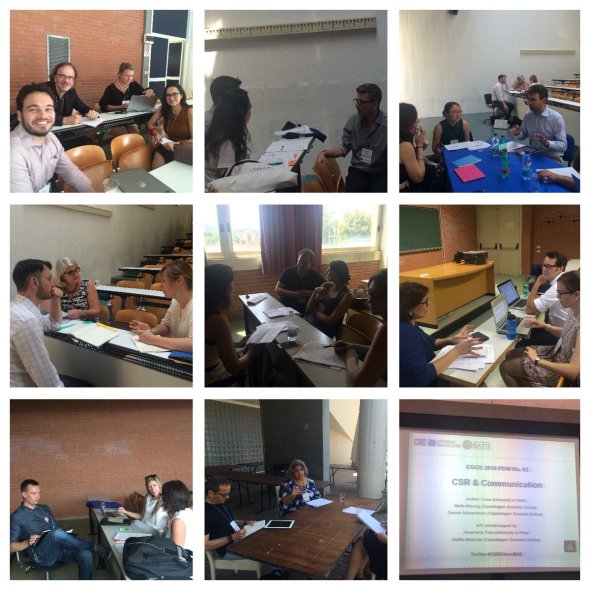EGOS Pre-Colloquium Development Workshop (PDW) on “Digital Media, Communication & Organization” in Hamburg (July 1st, 2020)
Posted: February 13, 2020 Filed under: Uncategorized Leave a commentThis workshop aims to advance early-stage and work-in-progress research that addresses the interplay of digital media, communication, and organization. You will find more info about this PDW on the website of the European Group of Organizational Studies (EGOS). The deadline for short paper submissions is March 31, 2020. We (= Armin Beverungen, Mie Plotnikof & Dennis Schoeneborn) are looking forward to reading your short papers and to seeing you in (beautiful) Hamburg!
Call for Papers: 2nd Meeting Science Symposium in Copenhagen (May 23-24, 2019)
Posted: February 24, 2019 Filed under: Uncategorized Leave a comment(Sent on behalf of Christoph Haug, University of Gothenburg:)
When it comes to analysing communicational events, meetings are surely a key site for scholars of organizational communication. But meetings are also studied in a variety of other fields and disciplines. The Meeting Science Symposium aims to facilitate dialogue between meeting researchers from different backgrounds. After its first edition in Gothenburg in 2017 (see report here), the 2nd Meeting Science Symposium is scheduled to be held in Copenhagen on May 23-24, 2019 – and the deadline for the submission of abstracts is 4 March 2019.
You can find the CfP at https://kunsido.net/mss2/
It would be great to see contributions from the “Organization as Communication” community there!
EGOS Pre-Colloquium Development Workshop (PDW) on “Analyzing Qualitative Data in a Communicative Perspective” in Edinburgh (July 3rd, 2019)
Posted: February 24, 2019 Filed under: Uncategorized Leave a commentThe general purpose of this PDW – as part of the EGOS Standing Working Group (SWG) 05 “Organization as Communication” – is to help organization scholars interested in the connection between communicating and organizing, especially at PhD level and in the early stage of their career, to refine their analytical skills and to acquire new tools to deal with different types of data.
Read more about the call for applications here. The PDW will take place in Edinburgh, Scotland on July 3rd, 2019 (from 09.00-13.00).
Apply via the EGOS website no later than April 2nd, 2019.
Convenors: Joëlle Basque (Université TÉLUQ, Canada), Christoph Haug (University of Gothenburg, Sweden), and Nora Meziani (HEC Montréal, Canada)
Facilitators: Jeanne Mengis (Università della Svizzera Italiana, Switzerland), Joep P. Cornelissen (Rotterdam School of Management, The Netherlands), and Steffen Blaschke (Copenhagen Business School, Denmark)
Sub-Theme at EGOS 2019 in Edinburgh: ‘Organization as communication: Exploring the communicative incarnation of organization’
Posted: November 6, 2018 Filed under: Uncategorized 1 Comment At the European Group of Organizational Studies (EGOS) Colloquium 2019 in Edinburgh, Scotland (July 4-6, 2019), the EGOS Standing Working Group (SWG) Organization as Communication will be hosting a sub-theme entitled “Organization as Communication: Exploring the Communicative Incarnation of Organization” (convenors: Joep Cornelissen, Boukje Cnossen & Dennis Schoeneborn). The idea of the sub-theme is to connect communication-centered perspectives on organizations with questions of entrepreneurship, creativity, innovation, change, and/or new forms of organizing. Please find here the (updated) Call for Submissions (and the deadline for short paper submissions of 3,000 words max. is Jan. 14, 2019!)
At the European Group of Organizational Studies (EGOS) Colloquium 2019 in Edinburgh, Scotland (July 4-6, 2019), the EGOS Standing Working Group (SWG) Organization as Communication will be hosting a sub-theme entitled “Organization as Communication: Exploring the Communicative Incarnation of Organization” (convenors: Joep Cornelissen, Boukje Cnossen & Dennis Schoeneborn). The idea of the sub-theme is to connect communication-centered perspectives on organizations with questions of entrepreneurship, creativity, innovation, change, and/or new forms of organizing. Please find here the (updated) Call for Submissions (and the deadline for short paper submissions of 3,000 words max. is Jan. 14, 2019!)
Brief report from the Gothenburg Meeting Science Symposium 2017
Posted: June 25, 2017 Filed under: Uncategorized 1 CommentBy (guest contributor) Christoph Haug
On 23-24 May 2017, 50 scholars from 13 countries met for the first interdisciplinary gathering of meeting researchers (more info: https://kunsido.net/gmss). Sociologists, psychologists, linguists, social anthropologists, political scientists, organization and management scholars, and even some consultants with their practice oriented perspective mixed and met with much curiosity and willingness to transcend the disciplinary blinders that have isolated them from each other during the past 10-20 years of growing research on meetings.
The symposium was organized by Christoph Haug, currently as Marie-Curie Fellow at the Gothenburg Research Institute, after having come across so many different research groups and individuals who shared an interest in face-to-face meetings but who were often unaware of each other. Initially, the event was planned for 20-30 people, but turned out to attract a much larger community of scholars that were interested in participation.
The most manifest indicator for the symposium’s success is probably that participants started to discuss possibilities for follow-up events already the first evening. Two European universities are likely to host follow-up events in the coming years and CCO scholars with an interest in meetings as a specific type of communicative event are welcome to join this growing community. To be informed about upcoming events and to join the discussion already now, join the Kunsido online forum at https://forum.kunsido.net/signup.
EGOS 2017 Sub-Theme No. 05 “The Communicative Constitution of Organizing”
Posted: October 7, 2016 Filed under: Uncategorized Leave a commentThe EGOS Standing Working Group (SWG) No. 05 Organization as Communication (formerly SWG No. 16) is happy to announce the sub-theme for the EGOS 2017 Colloquium in Copenhagen, Denmark (July 6-8, 2017).
The sub-theme No. 05 entitled “The Communicative Constitution of Organizing: Toward and Beyond (Formal) Organization” will be facilitated by Dennis Schoeneborn, Timothy R. Kuhn, and James R. Barker.
As you will see in the Call for Papers, the sub-theme places a special focus on the formative and constitutive role of communication for practices of organizing that occur toward and beyond formal organization. That said, we also invite conceptual or empirical papers that more generally apply a communication-centered or discursive lens to study organizational phenomena of various kinds.
We are looking forward to receiving your short paper submissions (max. 3,000 words) by Jan. 9th, 2017 via the EGOS website!
See you in Copenhagen!

Storify Report of EGOS 2016 PDW on CSR & Communication
Posted: August 18, 2016 Filed under: Uncategorized Leave a commentIf you would like to get a peek into what happened at the EGOS 2016 PDW on “CSR & Communication” in Naples/Italy, please check out our brief Storify report here (generated with friendly support of our social media expert, Annamaria Tuan, University of Pisa).

And please also make sure of course to take a look at the video podcast of the panel debate that was posted earlier in this blog.
Workshop on “Large Social Phenomena” at the University of Warwick (Dec. 5-6, 2016)
Posted: August 3, 2016 Filed under: Uncategorized Leave a commentCheck out this exciting workshop on “Large Social Phenomena” at the University of Warwick, Coventry, UK (Dec. 5-6, 2016), jointly organized by Davide Nicolini (U of Warwick) and Katharina Dittrich (U of Zurich). The Call for Papers explicitly invites communication-centered approaches – see here: Workshop on Large Social Phenomena.
New Book on Organizational Memory as a Function
Posted: June 16, 2016 Filed under: Uncategorized Leave a commentPaper on “The Communicative Constitution of Anonymous” just published in JMS
Posted: November 13, 2015 Filed under: Uncategorized Leave a comment A common feature of most organization-as-communication approaches is a processual view on organizational formation and reproduction, emphasizing the inherently precarious character of even the most bureaucratic organizations. But what about loose social collectives, such as online communities, terrorist networks, or hacker collectives? Is the notion of ‘organization’ useful for describing such fluid social collectives at all?
A common feature of most organization-as-communication approaches is a processual view on organizational formation and reproduction, emphasizing the inherently precarious character of even the most bureaucratic organizations. But what about loose social collectives, such as online communities, terrorist networks, or hacker collectives? Is the notion of ‘organization’ useful for describing such fluid social collectives at all?
In a recent article published in the Journal of Management Studies (JMS)*, Leonhard Dobusch and Dennis Schoeneborn suggest using the term ‘organizationality’ for a gradual differentiation of social collectives regarding the degree to which they achieve the status of organizational actorhood. In the authors’ view, one crucial precondition of organizationality is the accomplishment of some form of collective identity through speech acts (“identity claims”) that try to delineate – and thus attribute – what the social collective is or does.
To address the research question on how identity claims contribute to the communicative constitution of fluid social collectives as organizational actors, Dobusch and Schoeneborn mobilize a ”communicative constitution of organizations” (CCO) perspective. Empirically, the authors are investigating the case of the “hacktivist” (i.e., hacker activist) collective Anonymous. Their study contributes to organization studies by showing that fluid social collectives (such as Anonymous) are able to temporarily reinstate organizational actorhood through the performance of carefully prepared and staged identity claims.
* Full reference: Dobusch, L., & Schoeneborn, D. (2015). Fluidity, Identity, and Organizationality: The Communicative Constitution of Anonymous. Journal of Management Studies, 52(8), 1005-1035 (the article is available open access until December 4, 2015).
